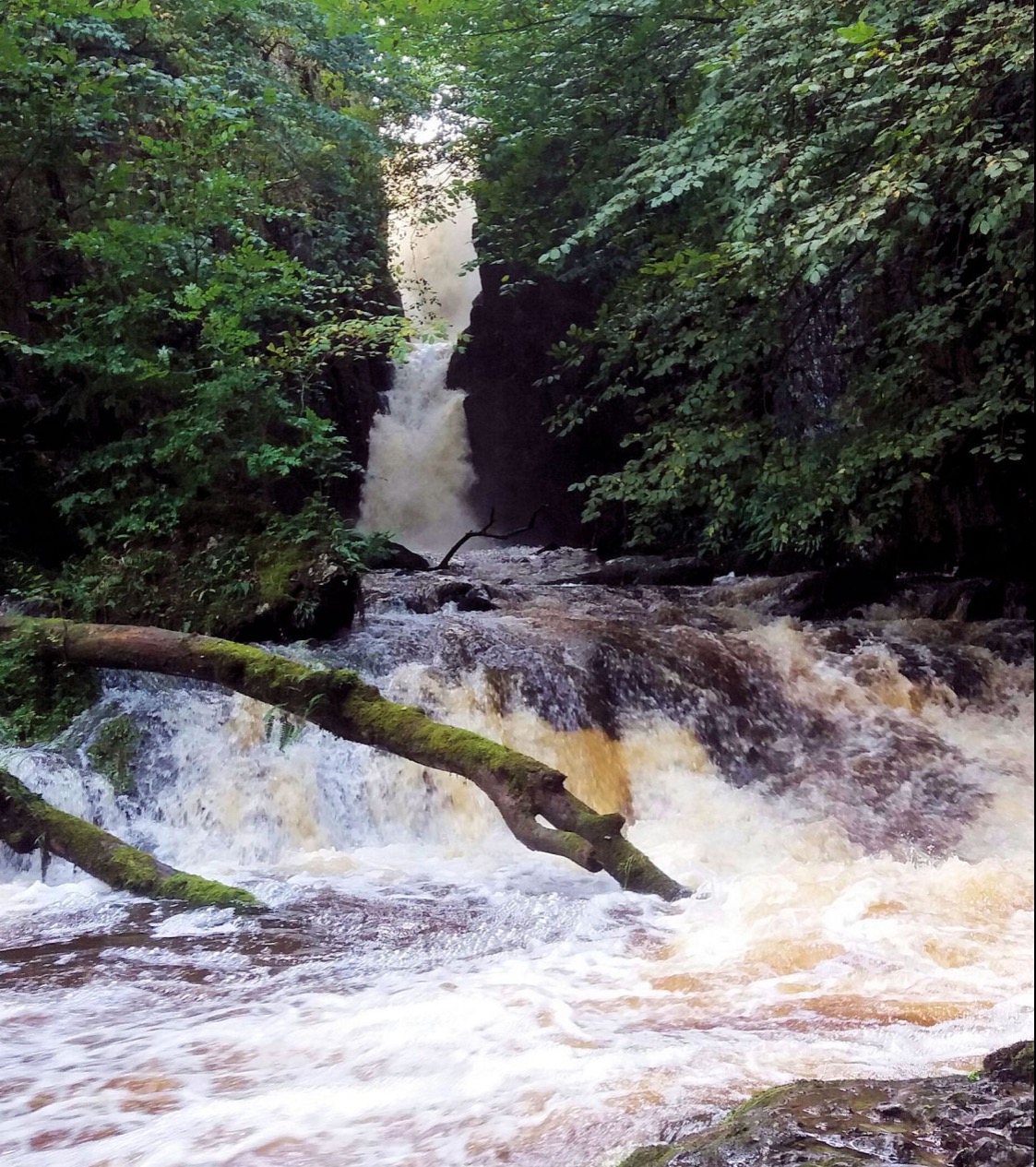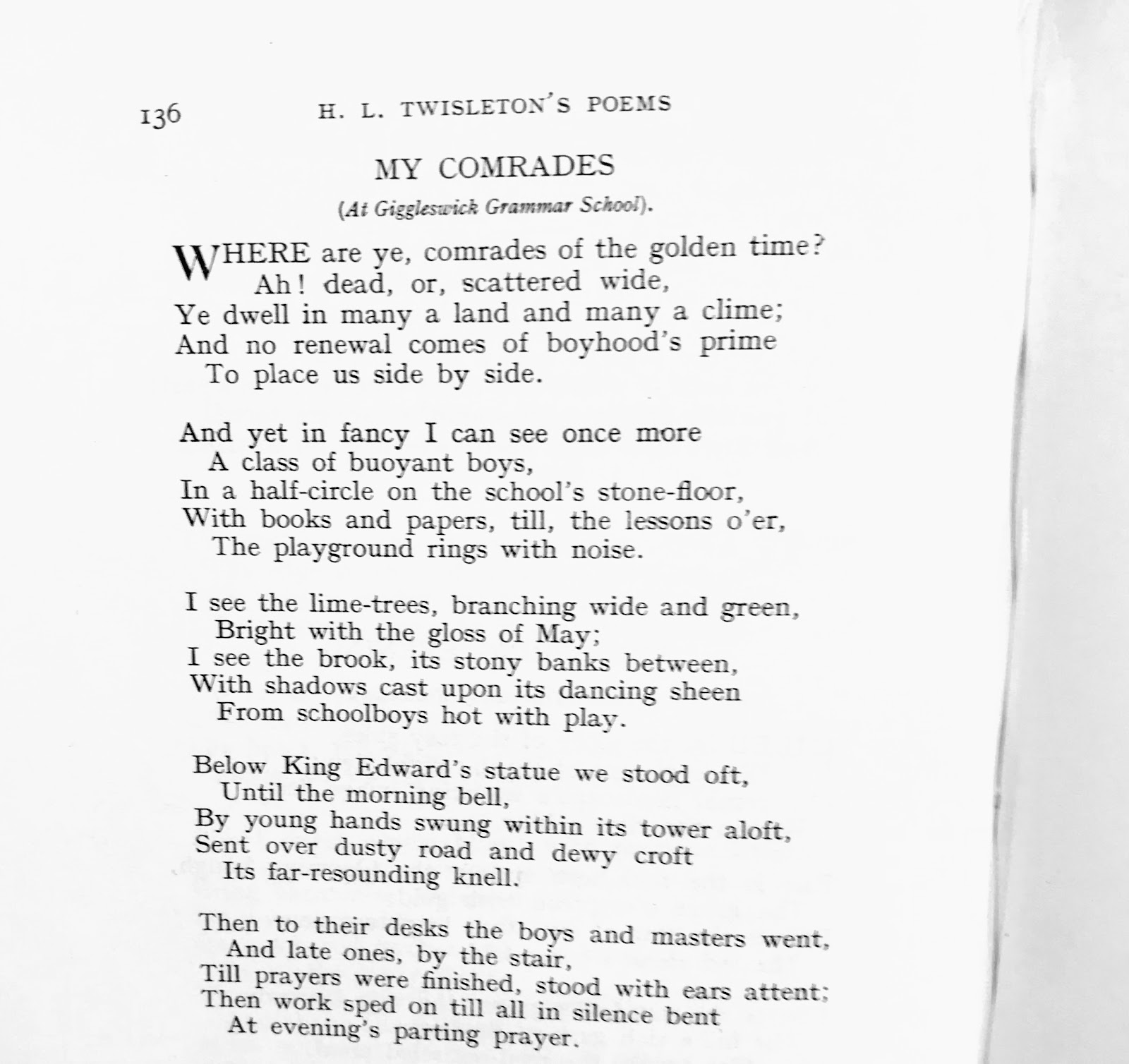Settle’s 2017 celebration of Tom Twisleton’s Centenary left his brother poet Henry Lea (1847-1905) in the shade. That was inevitable given Tom’s uniqueness as that rare breed of dialect poet. The two brothers started life up at Winskill two years apart sons of Frank Twisleton affectionately known as ‘The Craven Giant’, ardent in the Temperance cause. Henry’s poems are appended to most editions of ‘Poems in the Craven Dialect’ where we read: ‘Both brothers had the poetic soul, the poetic gift. In the one case it found its apt expression in the quaint and vigorous Craven dialect; in the other, in choice English and carefully polished lines’.

This is the first of 79 poems published by Henry Lea Twisleton, younger brother of Craven dialect poet Tom Twisleton, of which a great proportion reflect on the seasons. Henry moved to New Zealand around 1875 where he lived the rest of his life and where the seasons fall differently. Leaves especially fall less with a preponderance of ever-green over deciduous trees which clearly touched his poetic spirit into celebrating the contrast with autumn in the land of his birth. The poem in the picture was composed 10 October 1864 when Henry was aged 17.

Henry Lea’s evocative poem on Catterick Foss uses the dialect title for the Force or Waterfall. It’s in ‘Poems in the Craven Dialect by Tom Twisleton also poems by Henry Lea Twisleton and Henry Lea Twisleton (Junior)’ Seventh Edition 1953. There’s a lovely story of Henry Lea and Tom Twisleton breaking the ice in the pool below the waterfall one Christmas Day. As the caption to the Where2Walk website picture reproduced notes: ‘The Force is hidden away in a deep gorge above the village of Stainforth. There are 2 main drops of 20 plus foot … apparently the famous composer Elgar’s favourite spot’.

The preface to the poems of Henry Lea Twisleton (1847-1905) invites the reader to compare his fine, polished poem on Catterick Foss to his brother Tom’s dialect ‘Letter to Joe Steel’ on the same terrain. This runs in verse 10: ‘Then, pardon me, if now I raise/A stave or two to sound the praise/Of Craven’s hills an’ caves;/Of fertile daals an’ flowing brooks, /Of watter-faus an’ shady nooks,/Whar t’ fir an’ t’ hazel waves’. Henry’s ‘budding ash perchance is bending’ and ‘mountain-born… beck descending’ betray his Giggleswick School education in contrast to his brother.

In his poem on Catterick Foss (picture from Where2Walk website) Winskill-born Henry Lea Twisleton (1847-1905) reminiscences from New Zealand of summer evenings in his youth when ‘I sought the Foss, in gloom descending; while wondrous as a fairy wand, its voice, in stillness, to my ear, brought music of another sphere’ (v5). Like Henry I’m exiled from Settle to Sussex, Dalesman become Downsman, not as far south as his exile! His memory of Catterick matches mine of Scaleber Force, more accessible to us in Settle, where I have found the same musical stillness.
The poem Catterick Foss in ‘Queen’s English’ by Henry Lea Twisleton contrasts with the Craven dialect poems of his older brother Tom the Centenary of whose death Settle celebrated in 2017. The preface to Henry’s poems, published with Tom’s, reads: ‘In his early years the boy gave proof of that love of books and of nature, and of that thirst for knowledge that were his through life. He was taught first at Langcliffe, and afterwards at Settle National School. He then became a day-boy at the Grammar School at Giggleswick, which had not yet ceased to be a Free School’.

My friend and fellow Old Giggleswickian David Gilchrist gave me his copy of Atkinson’s ‘Giggleswick School Register 1499-1921’ before he died. It has entries for both his father and mine who were also friends. This reproduction of page 57 shows the entry for the poet Henry Lea Twisleton (1847-1905) who had but a brief spell as pupil at Giggleswick between January and December 1862. Was the brevity finance linked? Maybe older brother Tom missed a Giggleswick School education on that account. Both however are part of Settle heritage through their poems read to this day.

‘God speed the school! And grant it sons of worth, to give to all the regions of the earth true-hearted Englishmen’ concludes this poem written from New Zealand by Old Giggleswickian Henry Lea Twisleton (1847-1905). Though I attended Giggleswick a century on - I’m still young enough to preach in Chapel (!) - the poem evokes scenes familiar to me like passing King Edward’s Statue after prayers to head for lessons. Twisleton (1862) supplemented his Giggleswick education at Settle’s Mechanics’ Institute where his retentive memory served good use of its library. Henry’s memories enrich his poems as in this tribute to OG ‘Comrades’.

Settle’s late Yorkshire Bank was first employer of poet Henry Lea Twisleton, my first cousin twice-removed, just as its Midland Bank first employed Greg my father. In 1862 Henry left Giggleswick School to work there as a clerk for six years moving on to their Wetherby branch for another five years. The preface to his poems notes: ‘Whilst at Wetherby he exercised to the full the walking-powers with which he was endowed… inherited from his father [Francis Twisleton ‘The Craven Giant’ (1812-1875)]. It was not an uncommon thing for him to turn up at Winskill after a forty miles’ walk, via Grassington, from Wetherby’.

If we think we live struggling in an age of anxiety Settle poet Henry Lea Twisleton conveys just the same from two centuries back. His poems, neglected compared to the dialect poems of brother Tom, show psychological insight. In not much more than 100 words our poet captures the soul’s ‘wild hunger’ pleading for the ‘gnawing, quenchless fire’ to be made into ‘a soft, warm light’. Henry (1847-1905) sees our will as the clue, that decisive faculty granted to repel anxiety and call down the ‘dove’ of peace with the ‘holy calm’ it brings to heart and sense.

This view of Winskill would be familiar to Settle then New Zealand poet Henry Lea Twisleton born here 1847. In the preface to his poems, we read how when he worked in Wetherby he regularly walked home. ‘On one occasion… having reached Settle he was accosted by a tramp who asked the way to the lodging-house. Although Mr Twisleton had walked forty miles, and had yet to walk to Winskill, he went with the tramp into Upper Settle and showed him the place. But that was a characteristic act. He would help another… at almost any personal cost’.

My first cousin twice removed Henry Lea Twisleton (1847-1905) was gifted to capture in words both awe at the natural world and humility before the inner world. His poem ‘Unfulfilled’, written in New Zealand, recognises his spiritual poverty despite the riches he has gained. He is ‘far poorer now than when in some lone spot I loved to dream’ as he did up at Winskill near Settle. The changing Seasons are a big feature of his poetry. This poem recognises how such changes deceive since ‘the happiness we strive to gain in Time can flourish only in a fairer clime’ i.e.eternity.

After Settle poet Henry Lea Twisleton sailed to New Zealand he wrote this poem ‘Farewell to Craven’ (1876). It welcomes rata-blooms replacing the primroses of his native Craven. The preface to his poems quotes his 1905 obituary which ‘speaks of his ability and thoroughness, his strict conscientiousness, and the high esteem in which he was held… prominent mile runner up to forty, oarsman of some repute, long distance walker… hard to keep up with in mountaineering… although he never recrossed the ocean, he still kept a warm place in his heart for his old English home’.

Today would be the 120th birthday of my late father Greg Twisleton (1900-1974). A generous and popular man he was well known in Settle in both his earlier and later years. Dad was a Victorian, born before the death of Queen Victoria, which means my nuclear family straddles three centuries. Born above my grandparents’ shop in Settle Marketplace, just down from today’s Coop, his career started as clerk in the Midland Bank across the square. It ended when he served as Midland bank manager at Thorne near Doncaster until his retirement in 1963. He married my mother, Elsie (1922-2020) from Hellifield in 1948. Our family moved from Thorne to 1 Stackhouse Lane, Giggleswick where Greg became a Settle character. He always sported his Old Giggleswickian tie shown in the photograph of him in his 30s. My younger brother Tony (1950-1984) and I both went to Giggleswick School. I vividly recall dad taking me for my first pint of beer in Settle Social Club, then in the centre of town, as well as regular visits with him to his close friends Herbert and Agnes Grisedale in their antiques shop at The Folly. On 14 September God-willing we will lay mother’s remains to rest beside those of my father and brother after a Requiem in Holy Ascension Church where both my parents sang in the choir.

We stayed recently at the Royal Oak, Settle with a brilliant view of the market place and all its activity. Top right the view from our room, on the left buildings which included my grandfather’s shop above which my father Greg Twisleton was born 1900. Bottom right a view of the Royal Oak from Castleberg Rock above the town and bottom left the day the bikers descended on Settle just before the new COVID 19 restrictions.

As my dad Greg walked me up Penyghent in the 1960s I recently had the privilege of being accompanied by my sons 60 years on. James Twisleton took these pictures of Dave and I moving and reflecting as we accessed Penyghent the quick way from Silverdale Road which rises from Stainforth to Halton Gill. Mountains in the UK tend to be defined as over 2,000 feet with Penyghent at 2277ft lowest of all. It’s also lowest of the other members of the famous Three Peaks, Whernside and Ingleborough. You lose 1000 feet of the ascent driving as we did to the car park on Silverdale Road so we were up and down in just over 90 minutes. Our ascent had a biblical feel as, like Moses, we entered the clouds. This meant we missed the view of Morecambe Bay.

Water flowing over Queen’s Rock viewed from the footbridge between Giggleswick and Settle the weekend we laid my mother Elsie Twisleton (1922-2020)‘s remains to rest in Holy Ascension Churchyard. Elsie, Greg (d1974) and my brother Tony (d1984) saw this bridge built as a memorial to Giggleswick’s war dead when we lived around the corner at 1 Stackhouse Lane, Giggleswick. When I look at the flowing water of the Ribble displayed there I recall forebears who have enjoyed a similar view over at least eight centuries. Those words of Psalm 90’s paraphrase come to mind: ‘Time like a never ending stream bears all its sons away’ balanced by the optimism of faith: ‘those who drink of the water Christ gives them will never be thirsty’ (John 4:14).
On 14 September I celebrated a Solemn Requiem in Holy Ascension, Settle with family and friends after which we interred my mother Elsie’s ashes in the grave of my father Greg and my brother Tony. Besides being my most dear mother Elsie, who died aged 98 on 13 February, was a Christian of great integrity. She held to the catholic and apostolic church built on Peter’s faith that the risen Jesus is universal Lord and Saviour and that the gates of hell will not prevail against his Church. It was a beautiful day in Settle and a relief to complete her funeral rites after a six month delay with the assistance of Anne, David, John and James and the great parish team. Requiem homily at http://johntwisleton.blogspot.com/





Comments
Post a Comment